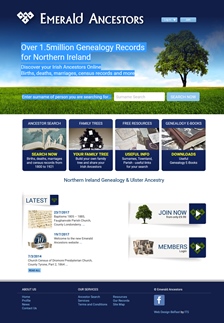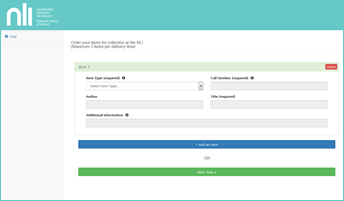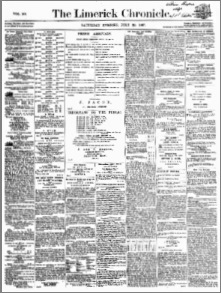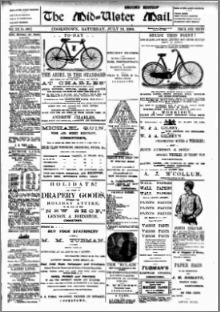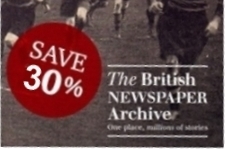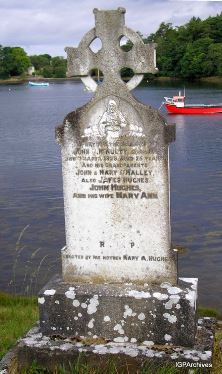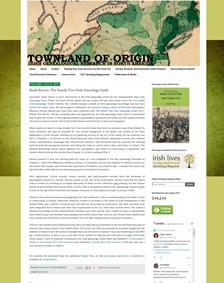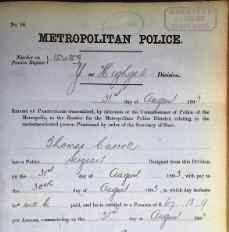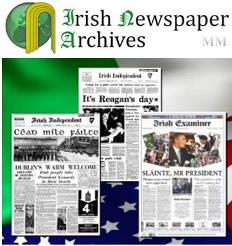Monday 31 July to end of year: Out of the Doctor's Bag. Hosts: RCPI in collaboration with the Retired GPs Group of the Irish College of General Practitioners. Venue: RCPI Heritage Centre, 6 Kildare Street, Dublin 2. Open 10am-4pm, Monday-Friday. Free. All welcome. No booking required.
Thursday 3 August: An Introduction to Irish Genealogy Online, with PJ Smith, Kathy Robins and Lynne Puckett. Host and venue: Billings Public Library, 510 North 28th Street,
Billings, Montana, USA. Free. All welcome. 6:30 pm. For more information, T: (406) 657-8258.
Friday 4 August:
Thomas Ashe—martyr, musician, sportsman and Gaeilgóir, a History Ireland Hedge School. Venue: Lispole Community Hall, Garrynadur,
Lispole, Co. Kerry. Panel includes Mary McAuliffe, Richard McElligott, Joe Higgins and Micheál Ó Moráin. 7:30pm. All welcome.
Saturday 5 August:
Irish Names Through History, with Jacquie Ziegler. Host and venue: Billings Public Library, 510 North 28th Street,
Billings, Montana, USA. Free. From 2:30 to 4 p.m. All welcome. For more information, call the library on (406) 657-8258.
Saturday 5 August:
Militaria and Medal Fair. Host: Medal Society of Ireland. Venue: Knox Memorial Hall,
Monkstown, Co. Dublin. 1pm-5pm. All welcome. Admission: €4/members €2.
Saturday 5 August: Roger Casement and the Irish in Islington, a historical walking tour. Hosts: Wolfe Tone Society London and London Easter 1916-1924 Centenary Committee. Meet at Tube Station, Caledonian Rd,
London N7, then walking to HMP Pentonville prison and other areas of interest around South Islington associated with Irish History. Noon to 2pm, approx. Free.
Details.
Monday 7 August: Public Holiday in
Republic of Ireland. All repositories, archives, libraries etc closed. Free Genealogy Advisory Services at National Archives of Ireland and National Library of Ireland will not be operating.
Tuesday 8 August: Irish Genealogy Hour – hands-on research in the computer classroom. Host and venue: Billings Public Library, 510 North 28th Street,
Billings, Montana, USA. Free. All welcome. Noon to 1pm. For more information, T: (406) 657-8258.
Tuesday 8 August: British & Irish newspapers, and Irish Family History Resources Online, two lectures with Chris Paton as part of the Researching Abroad, British Isles & European Ancestors conference taking place 8 and 9 August at Kedron Wavell Services Club, 21 Kittyhawk Drive, Chermside South,
Queensland 4032, Australia. 9:00am-4:50pm each day. Day fees apply.
Details and registration.
Tuesday 8 August: Genealogical evening, with Dr Paul MacCotter. Host and venue: Franciscan Well Brewery pub, North Mall,
Cork City. Introduction to Irish genealogy for beginners; family history and surname origins advice for the more advanced. 8:30pm. Free. No booking required.
Wednesday 9 August: The Big Houses of East Belfast, with Roger Dixon. Part of the Eastside Arts Festival 2017. Host: PRONI. Venue: PRONI, Titanic Boulevard,
Belfast. 1pm. Free.
Advance registration necessary.
Thursday 10 August: Irish nurses in the First World War, with Dr Phylomena Badsey. Hosts: Western Front Association and PRONI. Venue: Public Record Office of Northern Ireland, Titanic Boulevard,
Belfast, BT3 9HQ. All welcome. £4 donation requested. 6:30pm to 8:45pm.
Details.
Thursday 10 August: Delayed opening at National Library of Ireland. All areas/locations of the National Library in
Dublin will remain closed until 11am to facilitate a staff development meeting.
Thursday 10 August: Public tour of WWIreland Exhibition, Exploring the Irish Experience at home and abroad. Host and Venue: National Library of Ireland, 2/3 Kildare Street (next door to main building),
Dublin 2. Free. 2pm. No booking required.
Thursday 10 August: Waterford's medieval walls, an evening fieldtrip. Host: Waterford Archaeological & Historical Society. Venue: Meet in the Applemarket,
Waterford City at 7pm. All welcome. Members free. Non-members €5.
Friday 11 August: Behind-the-Scenes Tour of PRONI, with archival staff. Covers the research areas, the sorting, listing and cataloguing of new materials, the secure stores, the Conservation Suite and the Photography Studio. Host and Venue: Hosts: The Public Record Office of Northern Ireland and the Belfast Titanic Society. Venue: PRONI, 2 Titanic Blvd, Titanic Quarter,
Belfast, BT3 9HQ. Free. Two identical two-hour tours: choose 10am or 2pm.
Register.
Friday 11 August to Sunday 13 August: The Irish Fair of Minnesota. The largest free Irish fair in the USA takes place this weekend, with entertainment, Celtic Kitchen, a cultural area, vendors. Family history help will be on offer from the Irish Genealogical Society International stand. Venue: Harriet Island, St.
Paul, Minnesota, USA. Open Friday, Noon to 7pm; Saturday & Sunday, 10am to 6pm.
More details.
